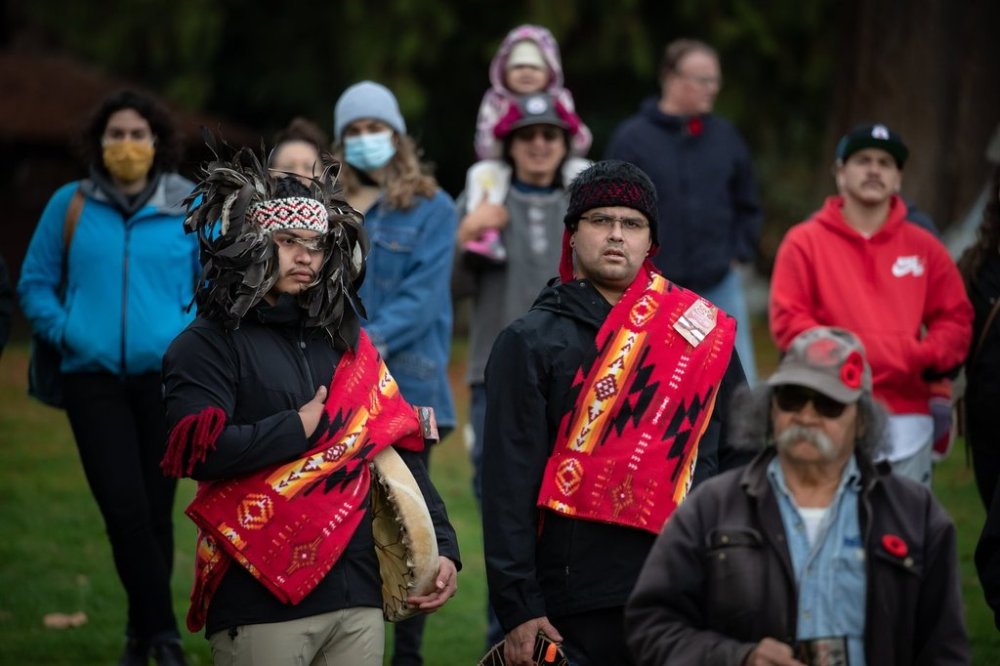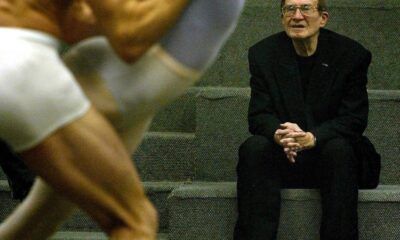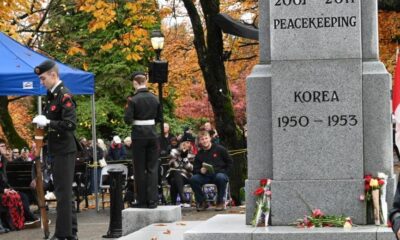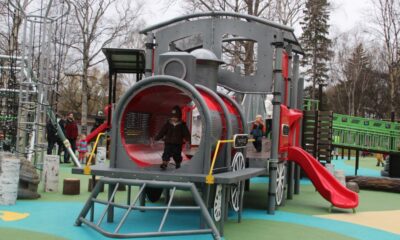Science
Indigenous Veterans Reflect on Service and Struggles in Canada

VANCOUVER – Indigenous veterans have fought not only on foreign battlefields but also against discrimination upon their return home. John Moses recalls how his father, Russell Moses, faced prejudice after serving in the Korean War. When he returned to Canada in 1952, Russell was denied entry to a bar in Hagersville, Ontario, solely due to his Indigenous background.
John Moses, a member of the Delaware and Upper Mohawk bands from Six Nations of the Grand River and a third-generation member of the Canadian Armed Forces, reflected on this irony. “After having fought abroad for the sovereignty of small nations overseas, they came back to a country where we still did not enjoy the same range of civil and political rights as other Canadians,” he stated.
As Canada commemorates Indigenous Veterans Day on November 8, it highlights the unique experiences of Indigenous soldiers. Historian Scott Sheffield noted that for many, military service offered a sense of belonging, away from the racism encountered at home. The observance began as a grassroots movement in Winnipeg in 1993 and has evolved into a nationally recognized day, which Sheffield describes as a “logical precursor to Remembrance Day” on November 11.
Many question why Indigenous people would fight for a nation that marginalized them. Sheffield suggests that motivations varied widely, with some enlisting for adventure or economic reasons, while others made a political statement. For instance, Tommy Prince, one of Canada’s most decorated World War II veterans, famously served “to prove that an Indian was as good as any white man.”
Sheffield points out that the camaraderie experienced in combat often dissipated upon returning home. “They expected that acceptance to continue after the war, to be honest, and that was more disillusioning,” he said. Veterans returned to a society where, as they described, they were “just an Indian again.”
Many Indigenous veterans who served in World War II also enlisted for the Korean War, seeking to recapture the sense of acceptance they found during their military service. According to Veterans Affairs Canada, more than 4,000 Indigenous people served during World War I, with one in three able-bodied men volunteering. In World War II, over 3,000 First Nations people contributed, although Sheffield estimates the number may be as high as 4,300, as records did not consistently note ethnicity.
The federal government acknowledges the unfair treatment of Indigenous soldiers and notes that many believed their sacrifices would improve their rights and standing in Canada, a hope that largely went unfulfilled. This lack of recognition has had lasting impacts on Indigenous veterans and their communities.
In recent years, reconciliation efforts have increased recognition of Indigenous veterans. The Last Post Fund Indigenous Initiative, established in March 2019, ensures that no veteran is denied a dignified funeral or burial. To date, over 265 grave markers have been ordered and placed, with researchers working across the country to find unrecognized veterans’ graves. Floyd Powder, a veteran and researcher, emphasizes the importance of including Indigenous symbols or languages on these markers, stating that it acknowledges their service.
Veterans Affairs Canada affirms that celebrating Indigenous Veterans Day does not detract from Remembrance Day. “It instead enhances Veterans’ Week commemorations by shining a spotlight on the tremendous history of Indigenous service,” the department stated.
Sheffield remarks that November 8 serves as a reminder of the mutual respect and camaraderie felt by soldiers, both Indigenous and non-Indigenous, during their service. “Those are things we should take to heart as we walk the path of reconciliation and strive for respectful coexistence in our country moving forward,” he concluded.
This report was first published on November 8, 2025, by The Canadian Press.
-

 World4 months ago
World4 months agoScientists Unearth Ancient Antarctic Ice to Unlock Climate Secrets
-

 Politics2 days ago
Politics2 days agoSecwepemc First Nation Seeks Aboriginal Title Over Kamloops Area
-

 Entertainment4 months ago
Entertainment4 months agoTrump and McCormick to Announce $70 Billion Energy Investments
-

 Lifestyle4 months ago
Lifestyle4 months agoTransLink Launches Food Truck Program to Boost Revenue in Vancouver
-

 Science4 months ago
Science4 months agoFour Astronauts Return to Earth After International Space Station Mission
-

 Technology2 months ago
Technology2 months agoApple Notes Enhances Functionality with Markdown Support in macOS 26
-

 Top Stories4 weeks ago
Top Stories4 weeks agoUrgent Update: Fatal Crash on Highway 99 Claims Life of Pitt Meadows Man
-

 Sports4 months ago
Sports4 months agoSearch Underway for Missing Hunter Amid Hokkaido Bear Emergency
-

 Politics3 months ago
Politics3 months agoUkrainian Tennis Star Elina Svitolina Faces Death Threats Online
-

 Politics4 months ago
Politics4 months agoCarney Engages First Nations Leaders at Development Law Summit
-

 Technology4 months ago
Technology4 months agoFrosthaven Launches Early Access on July 31, 2025
-

 Top Stories2 weeks ago
Top Stories2 weeks agoFamily Remembers Beverley Rowbotham 25 Years After Murder




















